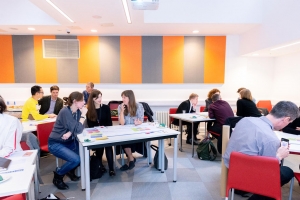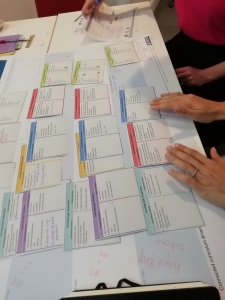Details of forthcoming workshops and links to LTI workshop resources and presentations.
Moodle Recharge 2019
Moodle will be upgrading to version 3.5 this summer, and therefore we will be holding an event for all LSE staff to provide an overview of the new features of Moodle.
The event will be held on Wednesday 12 June 2019 from 11:00 to 12:30 in the Old Building (OLD 4.10).
During the event, we will be providing everyone with a sneak peak of the changes that will be taking place this Summer in time for the new academic year and we will give attendees a chance to learn about the potentialities of Moodle as an educational tool to enhance teaching and learning.
To attend, please sign up on the LSE website as soon as possible.
If you need more details about the event, please contact LTI.
Course design – it’s as easy as ABC….
Last week as part of the TLC/LTI Atlas programme we were delighted to host Clive Young and Natasa Perovic from UCL’s Digital Education Advisory Team for a ABC learning design workshop. ABC was created by Clive and Natasa to enable programme and course teams to develop a logical and holistic approach to the design of learning on their programmes. Teams can use the workshop as an opportunity to review courses or programmes with any particular focus in mind, for example moving to a more blended approach or focusing on a school strategy or approach to teaching and learning.
Since its inception at UCL only three years ago, over 75 workshops have been run at UCL with nearly 500 academics (and students) redesigning around 200 modules. The participant response has been overwhelmingly positive and ABC is now used at 20 other universities in the UK. UCL Digital Education has also been awarded two years Erasmus+ funding to develop their ABC learning design workshop with 12 European universities.
ABC takes a hands-on team-based learning design approach in which participants co-create a visual storyboard for a module or course in just 90 minutes. All the workshop materials are released under Creative Commons licence and can be adapted and localised. Clive and Natasa briefly outlined the workshop structure and aims and then Steve Bond from the International Programmes office at LSE explained how they are currently using ABC to develop new online courses and review current courses.
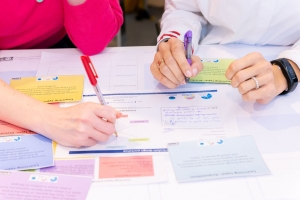 There were several programme teams from the LSE intensive courses practice exchange forum present and they quickly got to work on the first task which was to create a tweet which described their module or programme and to map out the current shape of activities on their course or programme as well as the balance of online and face to face activities. The aim of this activity was to make sure that everyone had a clear shared vision of the aims of the course or programme and review any areas for change or improvement.
There were several programme teams from the LSE intensive courses practice exchange forum present and they quickly got to work on the first task which was to create a tweet which described their module or programme and to map out the current shape of activities on their course or programme as well as the balance of online and face to face activities. The aim of this activity was to make sure that everyone had a clear shared vision of the aims of the course or programme and review any areas for change or improvement.
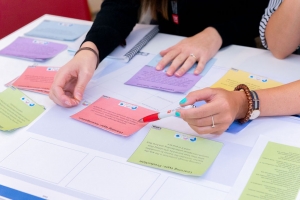 The next step was to start mapping out the learning types (Acquisition, Collaboration, Discussion, Investigation, Practice, Production) used in the course and then once this was agreed they could be described in more detail with methods of assessment indicated using gold stars (for summative) and silver stars (for formative). The shape of the revised course was then marked up on the original sheet and an action plan for next steps for any proposed changes were planned. Discussions during the workshop were lively as course teams talked through each activity and the course format and structure.
The next step was to start mapping out the learning types (Acquisition, Collaboration, Discussion, Investigation, Practice, Production) used in the course and then once this was agreed they could be described in more detail with methods of assessment indicated using gold stars (for summative) and silver stars (for formative). The shape of the revised course was then marked up on the original sheet and an action plan for next steps for any proposed changes were planned. Discussions during the workshop were lively as course teams talked through each activity and the course format and structure.
By the end of the session each team had a clear visual record of their course or programme and each table had a very different result. Although there is no right or wrong format for a course or programme , the final worksheet allowed immediate patterns to be identified such as the balance of assessment and the type of learning activities students are being asked to do. This can be particularly useful when looking at courses over a whole programme and allows convenors and other members of the programme team to see a course from a student point of view. Other institutions have also included students who have already completed the course to take part to gain more insight and feedback from alumni about how the course could be improved.
Feedback from participants was very positive as one participant noted:
“Working together to think systematically about the module was really helpful in bringing us together as a team and ensuring that we have a common sense of what we are trying to achieve with this module.”
Going forward we are hoping to run the ABC workshop at LSE with more programme and course teams. If you are interested in taking part in an ABC workshop then do get in touch (Lti.support@lse.ac.uk) and let us know.
Co-creativity and collaboration
It’s been a playful few weeks in LTI, starting with Chrissi Nerantzi from Manchester Metropolitan University presenting a workshop on playful and creative learning in HE.
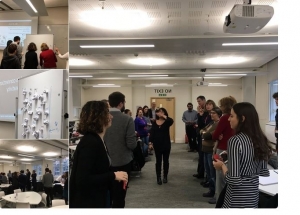 Chrissi’s workshop was full of exercises designed to get people moving, thinking and talking with others. She started off by pointing out that being creative doesn’t always mean coming up with something completely original, as remixing, adapting and taking ideas into another context is also creative. We discussed the fact that the majority of learning theories omit the emotional and physical aspects of the learning process. We were asked to think about what we enjoy about teaching and also to discuss our failures and what went wrong for us when teaching recently. Talking this through with another person and getting feedback on what intervention would help was very useful and illustrated that we probably don’t spend enough time sharing and getting feedback on failure and yet this is where we can learn the most.
Chrissi’s workshop was full of exercises designed to get people moving, thinking and talking with others. She started off by pointing out that being creative doesn’t always mean coming up with something completely original, as remixing, adapting and taking ideas into another context is also creative. We discussed the fact that the majority of learning theories omit the emotional and physical aspects of the learning process. We were asked to think about what we enjoy about teaching and also to discuss our failures and what went wrong for us when teaching recently. Talking this through with another person and getting feedback on what intervention would help was very useful and illustrated that we probably don’t spend enough time sharing and getting feedback on failure and yet this is where we can learn the most.
Chrissi recognised that sometimes it can be hard to make large scale change in institutions and gave some personal examples of the barriers and blockers that she has experienced but she also demonstrated that by taking a playful approach to your teaching and making small changes you can create a positive environment which encourages learners to experiment, be creative, try things out and get feedback.
 Following on the theme of play and creativity, this week I went up to Coventry University to attend RemixPlay2, a summit to celebrate the design and application of all things gameful, playful and creative in Higher Education. This is the second year of the event hosted by the Disruptive Media Learning Lab in Coventry University (see my blog post on last years’ event). This year’s focus was on co-creativity and collaboration. With similar messages to Chrissi’s workshop on taking an experiential approach to learning by doing, there were a lot of examples of how playful activities and games can be embedded within courses.
Following on the theme of play and creativity, this week I went up to Coventry University to attend RemixPlay2, a summit to celebrate the design and application of all things gameful, playful and creative in Higher Education. This is the second year of the event hosted by the Disruptive Media Learning Lab in Coventry University (see my blog post on last years’ event). This year’s focus was on co-creativity and collaboration. With similar messages to Chrissi’s workshop on taking an experiential approach to learning by doing, there were a lot of examples of how playful activities and games can be embedded within courses.
Ross Flatt from the Institute of Play in New York has worked with a lot of teachers to transform their practice and was an advocate of involving students in the design process and using games as tools for assessment. Sylvester Arnab’s in his keynote argued that the word ‘Fail’ should be defined as ‘First, Attempt In Learning’. He has worked with staff and students on several interdisciplinary projects to try and solve problems in the community. Sylvester has found that by giving students a sense of purpose and encouraging them to think creatively about how they can use what they have learnt to change the world for the better, they are more likely to engage and be motivated to learn. Changing assessment to problem or project based tasks provides students with an intrinsic motivation and shifts the focus away from learning just for passing exams.
Both events provided a lot of inspiration and ideas on the ways we can transform teaching and assessment to be more creative and collaborative. If you are interested in finding out more about using games for learning, we are holding a workshop on designing games for learning on Monday 26 February book a place via the training and development system.
We are starting a community of practice for anyone at LSE who is interested in playful and game-based learning in HE. If you are interested in joining please contact LTI.Support@lse.ac.uk.
If you have an idea on how to make your teaching more playful, creative or game based and would like some funding to support the implementation and evaluation we are currently accepting proposals for Spark and Ignite grants, the deadline for applications is Friday 2nd March, contact s.ney@lse.ac.uk for more information or to discuss your idea.
Playful and Creative Learning in HE
Next Tuesday LTI will be hosting a presentation by Chrissi Nerantzi (Principal Lecturer in Academic CPD, expert in creative, innovative learning, teaching and assessment from Manchester Metropolitan University) on Playful and Creative Learning. A good opportunity to reflect on what playfulness and creativity mean in an educational context and explore ways in which we can promote it in our practice.
Definition: What is playful learning?
In a blog post by JISC titled “Learning to play, playing to learn: the rise of playful learning in higher education“, Chrissi gives an explanation of what playful leraning means to her:
“Playful learning is using play activities to immerse ourselves and learn, either on our own or with others in a space we feel safe. In playful learning it’s ok to make mistakes when experimenting with new ideas, when challenging ourselves and others and doing things we normally wouldn’t do – which can lead us to surprising discoveries.
Playful learning can happen anywhere.”
Play and Its Connection to Creativity
The “Creativity for Learning in Higher Education” open course, based on the Manchester Metropolitan University’s PgCert and MA in Higher Education in which Chrissi is involved, offers colleagues with an interest in creative teaching and learning to explore three areas that foster more creativity in their practice and their students’ learning experience. One of which is play and games.
As Resnick (2017) puts it,
“Creativity doesn’t come from laughter and fun: It comes from experimenting, taking risks, and testing the boundaries.”
When it comes to experimenting, games are a very powerful learning tool. Games are by definition a space where the rule of the real world do not apply, thus providing a safe space to take risks and experiment with various choices, strategies and outcomes.
Moseley and Whitton (2015) define games as“a safe space in which participants have freedom to make mistakes, learn from failure, play with fantasy and identity, have control over decisions and outcomes”
Interested in finding out more?
Check out Chrissi’s various projects around playful and creative learning:
- #creativeHE Google + community site
- Creativity for Learning in Higher Education open course from MMU
At LSE
- Head to our dedicated web pages to find out more about Game-Based Learning and related projects run and supported at the LSE.
- Apply for our IGNITE and SPARK grants to support your game-based learning project for your own course or at programme and departmental level.
- Join Chrissi’s session on Tuesday 6th February or LTI’s practical session on Designing Games for Learning on 26th February
References
Resnick, M. (2017). Lifelong Kindergarten: Cultivating Creativity through Projects, Passions, Peers, and Play. MIT Press.
Moseley, A. and Whitton, N. (2015). Using Games to Enhance the Student Experience. Higher Education Academy
Changes to Moodle for 2016/17
The Moodle recharge event took place on Tuesday 27 June for those that couldn’t attend a brief summary of what went on can be found below.
 |  | 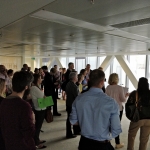 |
This summer lots of changes are taking place so we split attendees up into four rooms and got them to rotate round to each room. We asked everyone to give us feedback on the changes and the padlet is still open if you would like to comment.
New Features
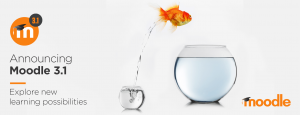 Adding links to Echo recordings will change with a plugin making it easier for students and teachers to view recordings – see our online guide.
Adding links to Echo recordings will change with a plugin making it easier for students and teachers to view recordings – see our online guide.
Reading lists will now be added using the External Tool or reading list blocks – see our online guide.
There are lots of new features for Moodle 3.1 – see our website for more details and new guides will be created over the summer. In addition to our usual Moodle training before the start of term we are also offering bespoke training sessions for departments. If you would be interested in this please get in contact (Lti.support@lse.ac.uk).
New themes
The look of Moodle is changing to be more modern and in line with the new LSE website.
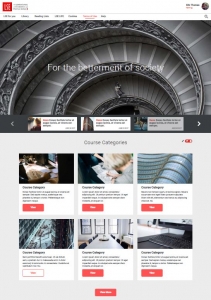 | 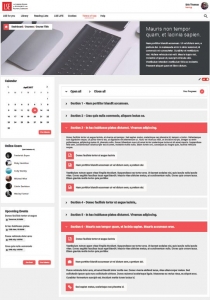 | 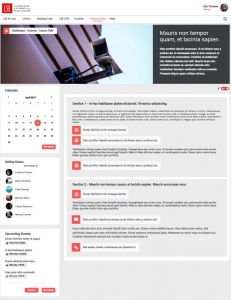 | 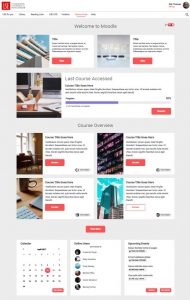 |
 LTI are working on getting the Moodle mobile app ready for 2017/18. The app can be downloaded from itunes or Google play and more information will be made available on our website over the summer.
LTI are working on getting the Moodle mobile app ready for 2017/18. The app can be downloaded from itunes or Google play and more information will be made available on our website over the summer.
Turnitin have also made changes to their theme and on 1 August will introduce the Turnitin Feedback Studio which featuers a user-friendly interface, with a responsive design that is compatible with a wide range of devices. More information about the changes can be found on our website.
My Feedback & Moodle archive
My Feedback is a feature that has been developed by UCL to improve access to assessment and feedback for students and staff. One single view for all Moodle activities with marks and feedback. The report will be combined with a live archive of Moodle so that users can view marks and feedback from previous years. There will be a variety of options for staff with different roles gaining an overview of students marks and feedback.
Coursework has been created by the Royal Veterinary College to enable more online and assessment and feedback options in Moodle. LTI will be working on making it compatible with LSE Moodle for individual pilot projects in 2017/18. Features include: double blind marking, sample marking, sampling workflows, personal deadline and no deadline assignments. If you are interested in piloting this please contact LTI.Support@lse.ac.uk
Moodle labs & Moodle Audit
 Moodle labs is a live instance of the most current version of Moodle which is available for LTI Spark or Ignite funded projects.
Moodle labs is a live instance of the most current version of Moodle which is available for LTI Spark or Ignite funded projects.
The Moodle Audit took place in March 2017. LTI went through the methods and overall findings of the independent review. Individual results will go out to each department in July for review with recommendations for improving your courses.
Next steps
Each department will be sent the results of the Moodle audit. We are currently working on new guides and case studies to go on our website ready for the start of term. We will be running bespoke Moodle training for departments – if you are interested in setting something up then please get in contact (LTI.Support@lse.ac.uk).
The Moodle refresh will take place on Tuesday 15 August for the majority of courses and Tuesday 12 September for courses used to collect dissertation submissions. On these dates Moodle will be unavailable all day and students must ensure that they have downloaded any materials they would like to keep before these dates. If you would like your course not to be included in the annual refresh then please let us know as soon as possible (email LTI.Support@lse.ac.uk). More information about the Moodle refresh is on our website.
Moodle recharge
Following on from our post back in February on our plans for Moodle we will be holding an event for all Moodle editors on Tuesday 27 June from 3-4pm to give everyone a sneak peak of the changes that will taking place this August in time for the new academic year.
 Moodle is getting a recharge for 2017/18. In addition to the usual refresh of all courses we will be upgrading to version 3.1. On the 27 June we will be going through some of the new features that we think editors will be most interested in and unveil our new theme for the platform. We will also share the results of our Moodle audit and invite Moodle editors to try out our new features ‘my feedback’ and Moodle labs.
Moodle is getting a recharge for 2017/18. In addition to the usual refresh of all courses we will be upgrading to version 3.1. On the 27 June we will be going through some of the new features that we think editors will be most interested in and unveil our new theme for the platform. We will also share the results of our Moodle audit and invite Moodle editors to try out our new features ‘my feedback’ and Moodle labs.
New features
 Moodle 3.1 features improvements to the layout, course editing, course administration, grading, and activities. We will go through some of the more significant changes plus give attendees a chance to try out our new interactive guides.
Moodle 3.1 features improvements to the layout, course editing, course administration, grading, and activities. We will go through some of the more significant changes plus give attendees a chance to try out our new interactive guides.
Moodle theme

LTI will be changing the look of Moodle to be more in line with the LSE website. We will give LSE Moodle editors a sneak preview of the new theme.
Moodle Audit
 In March 2017 LTI carried out/commissioned an independent review of a sample of LSE Moodle courses from across all the departments. Approximately 22% of all courses were reviewed using three different metrics – the 3E framework (Enhance, Extend, Empower), an overall classification and a traffic light Red, Amber, Green system. We will be sharing the findings of this audit and promoting some of the good practice that was discovered as a result. Individual reports will also be made available for departments which highlight areas or issues that were cause for concern or need attention.
In March 2017 LTI carried out/commissioned an independent review of a sample of LSE Moodle courses from across all the departments. Approximately 22% of all courses were reviewed using three different metrics – the 3E framework (Enhance, Extend, Empower), an overall classification and a traffic light Red, Amber, Green system. We will be sharing the findings of this audit and promoting some of the good practice that was discovered as a result. Individual reports will also be made available for departments which highlight areas or issues that were cause for concern or need attention.
Moodle labs
 A separate instance of Moodle that features the latest release for teachers to test out new approaches to teaching and is available for LTI grant projects.
A separate instance of Moodle that features the latest release for teachers to test out new approaches to teaching and is available for LTI grant projects.
My feedback
Developed by and rolled out successfully at UCL. My feedback allows students and staff a single view of all Moodle grades and feedback.
To reserve a place at the Moodle recharge event please book via the LSE Training and Development system.
More information about the Moodle refresh for 2017/18 can be found on the LTI website.
If you have any questions about the Moodle refresh or recharge email LTI.Support@lse.ac.uk
Playful learning
In February I was lucky enough to attend the ‘RemixPlay’ event at Coventry University. Hosted in the amazing ‘Disruptive Media Lab’ the day featured some really interesting speakers (Ian Livingstone (CBE), Bernie DeKoven, Professor Nicola Whitton and Dr Sebastian Deterding). There are already some great write-ups about the event which I won’t replicate here, instead see the blog post by Daryl Peel from University of Southampton and The Flying Raccon’s write up of Remix Play.
For me the conference highlighted the positive aspects of play and I left thinking that we should do more to invite ‘Playfulness’ in Higher Education. Creating a playful environment/community encourages exploration, collaboration, creativity and gives people agency to try things out and have the freedom to fail, all key conditions for learning. There is an abundance of literature on learning through play and it’s importance see ‘Play, Playfulness, Creativity and Innovation’ by Patrick Bateson, Bernard Suits book ‘The Grasshopper – Games, life and Utopia’ and the ‘How We Get To Next’ reading list on the Power of Play especially the video’s at the end.
Some nice examples of a playful environment given by speakers at the event:
http://www.musicalswings.com/about/
http://www.thefuntheory.com/piano-staircase
As Jordan Shapiro et. al. note in Mind/Shift Guide to Digital Games + Learning (Joan Ganz Cooney Center/KQED, 2014)
“Play is exploration. It involves imagination. It means investigating the world of the game and feeling the frustration, flow, and excitement that goes along with playing it.”
Games designed to enable learning are becoming more popular in Higher Education. Games are a more structured version of ‘play’ and allow players to problem-solve and often involve collaboration and peer learning. Although they often involve rules and winners, games give autonomy to the players and provide a safe environment to fail and to try and test things out. They are often about making decisions and then seeing the consequences and receiving feedback on your actions. As Professor Nicola Whitton stressed, students need low-impact opportunities to experience failure (micro failures); it’s how they get feedback, learn and improve.
Games at LSE
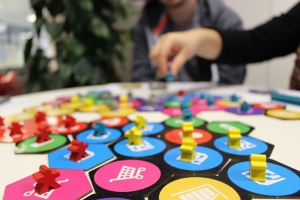 As part of an LTI grant, I have been working with colleagues in LTI on the LSE100 course to create a board game which was played in classes this term. One of the key difficulties when designing the game was to get the balance between play and content right. Too much content, and it’s not a game anymore, it’s a lecture and it’s not fun. Too much concentration on the game, and the learning outcomes are not as obvious and it’s harder for students to make the links between the concepts that you are trying to illustrate. We are now evaluating the game collecting and collating feedback from students and staff, so look out for updates on this shortly.
As part of an LTI grant, I have been working with colleagues in LTI on the LSE100 course to create a board game which was played in classes this term. One of the key difficulties when designing the game was to get the balance between play and content right. Too much content, and it’s not a game anymore, it’s a lecture and it’s not fun. Too much concentration on the game, and the learning outcomes are not as obvious and it’s harder for students to make the links between the concepts that you are trying to illustrate. We are now evaluating the game collecting and collating feedback from students and staff, so look out for updates on this shortly.
LTI has awarded several grants to projects involving games, including ‘Capture the Market’ board game mentioned above and an Ethnographic point and click video game, more info and resources can be found on our website.
Game workshop
If you are interested in exploring the use of games in education, we are running a workshop on ‘Designing quick and effective games for learning’ with Alex Moseley on Wednesday 26 April. Alex has been involved with games in education for 8 years and has lots of experience with designing games for learning. You can read an interview with Alex on this blog and you can book a place on the workshop on Eventbrite.
Spark grants
Applications for LTI spark grants are now open http://lti.lse.ac.uk/lti-grants/ with the deadline of Friday 5 May. If you are interested in finding out more, check out the LTI website and contact us to discuss your idea.
Live stream from NetworkED event Wednesday 1 March
As part of the LTI NetworkED seminar series, Professor Robert Allison Vice-Chancellor & President Loughborough University, will discuss ‘What is the place of technology in delivering an outstanding student experience?’.
More information about NetworkED and the upcoming seminar details can be found on the LTI website.
‘What is the place of technology in delivering an outstanding student experience?’
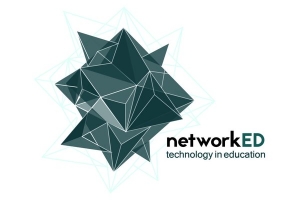 LTI are pleased to host Professor Robert Allison Vice-Chancellor & President of Loughborough University for our first NetworkED of 2017. Professor Allison will be discussing the role that technology and innovation have played in the success of Loughborough in becoming one of the leading universities in the UK, and the challenges he sees in the ‘uncertain futures’ for HE over the next 5 years.
LTI are pleased to host Professor Robert Allison Vice-Chancellor & President of Loughborough University for our first NetworkED of 2017. Professor Allison will be discussing the role that technology and innovation have played in the success of Loughborough in becoming one of the leading universities in the UK, and the challenges he sees in the ‘uncertain futures’ for HE over the next 5 years.
The talk will be held on Wednesday March 1st at 2.30pm and will be held in KSW G.01. Book your free ticket for this event here http://bit.ly/2lgAlSy
Ahead of his NetworkED seminar next week we had a quick Q&A with Professor Allison.
Q. You have been the Vice-Chancellor and President of Loughborough University since September 2012, how has Loughborough responded to the significant changes that have occurred in Higher Education during that time?
Loughborough has responded by maintaining a degree of agility, allowing us to respond promptly to the expectations of our students and through working in partnership with them as stakeholders in the University, not as customers or consumers.
Q. Loughborough University has been successful in numerous university rankings during this time including being awarded 1st for student experience in the TES 2016 survey, what are the key principles at the heart of that success?
The most important factor in our success has been seeing our students as co-creators of their education and wider student experience and, through this, giving them a tangible link to the success and future of the University.
Q. What role have technology and innovation played in the enhancing the student learning and teaching experience at Loughborough?
In some areas the role of technology has been significant, in others not relevant at all.
Q. The theme of the 2017 NetworkED seminars is ‘Uncertain Futures’, what do you feel will be the most potentially disruptive (or transformative) issue facing Higher Education institutions in the next 5 years?
Disruptive: competition.
Transformative: marketisation.
For those that cannot attend the seminar will be recorded and added to the LTI Youtube channel.
You may also be interested in attending our upcoming NetworkED seminars:
Liz Sprout from Google education on Wednesday 10th May
Andy Moss from Pearson Education on Wednesday 14th June.
Let us help!
 “Talk to us!”
“Talk to us!”
Whether you have a definite idea of how you want to use learning technology and innovate your teaching, see the potential for enhancement but need guidance and ideas, or even doubt the use of technology in education but think that things could be improved, just come and talk to us!
LTI are here to support all teaching staff at the LSE. We work with colleagues and the wider learning technology community to ensure we understand the purpose and uses of learning technology and explore innovative approaches to teaching and learning. We can work with you to test out new approaches to teaching in a safe and supportive environment, implementing them in your specific context to address the needs and expectations of you and your students.
 How can we help?
How can we help?
We provide day-to-day guidance with LSE-supported technologies such as Moodle and Turnitin and can help you with many more. If we don’t know it yet, we’ll learn with you! Visit our website for self-help guidance or drop us an email. We also organise training sessions and events on specific tools and approaches, open to any level. Have a look at what’s happening in Lent Term.
We evaluate LSE projects aimed at enhancing teaching and learning, from small to large scale, and share the results with the community. We keep an eye on what is being done in the learning technology community, what works and what doesn’t. We try it ourselves. We test it with willing staff, roll it out, evaluate it again, and promote it. Check out our reports and papers on e-assessment, learning spaces, lecture capture and many more on our website and LSE Research Online.
We promote good practice and celebrate teachers who “lead and live innovative teaching”, namely LSE Innovators. We learn from them and disseminate their ideas.
Finally, we offer dedicated help and support from senior members of the team and funding for your innovative teaching and learning ideas, from the time you come to us with your idea to the completion of your project. We will help you evaluate and disseminate it. We do this through our SPARK! grant scheme. Visit our funding pages to learn more and find inspiration in reading about past projects.


